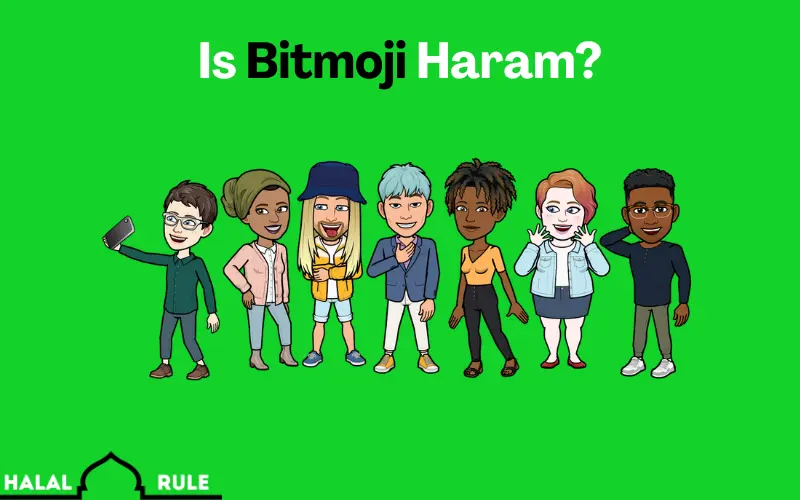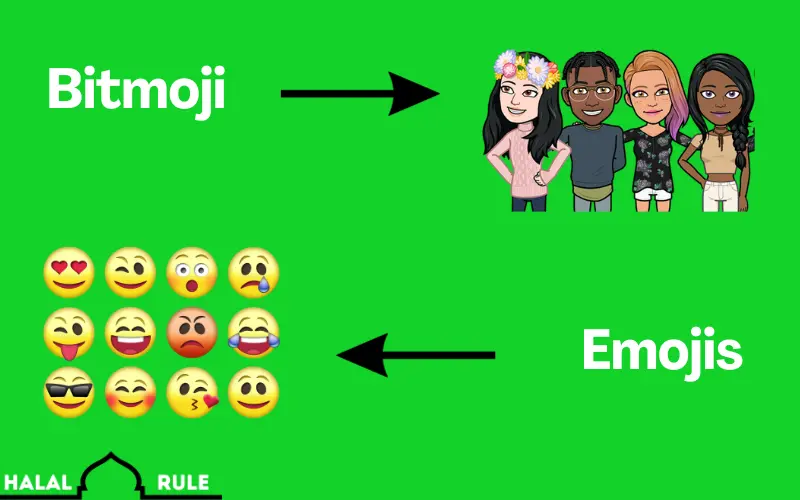Is Bitmoji Haram Or Halal In Islam?
In today’s digital age, there are countless ways in which people express themselves online. One popular way is through the use of Bitmoji, a personalized avatar that can be used to convey emotions and reactions in various social media platforms.
However, for some Muslims, the question arises is Bitmoji haram or halal because it resembles the creation of images, which is generally prohibited in Islam.
If you’re also confused about using or creating a Bitmoji, then this blog post is for you. We will dive deep into the concept of images in Islam and analyze whether or not Bitmoji falls under the category of haram or halal. Let’s clear the doubt.

Is Bitmoji Haram In Islam
It depends on the type of bitmoji you are using or creating. If the bitmoji has a complete human face, including nose, eyes, and ear, then it is considered haram in Islam to create or use.
However, if the bitmoji is missing any of these features, it is not considered haram. For example, if the bitmoji only has eyes, no nose, or no ear, it is considered halal.
This ruling is based on the prohibition of creating images with complete human features in Islam. Such creations are believed to be a form of playing God and can lead to idolatry.
This is because, in Islam, creating images of living beings (including humans and animals) is prohibited as it can lead to idolatry.
However, if the bitmoji does not have a complete human face and only represents a person through features like skin tone, hair color, and style, then it falls under the halal category.
As proof, you can refer to a hadith or Hazrat Aisha R.A. She said that once Prophet Muhammad (peace be upon him) says, the makers of this image will be punished on the day of resurrection, and they will be asked to give life to what they created. (Sahih Muslim)
So, according to this hadith, creating or using bitmojis with a complete human face is considered haram as it goes against the teachings of Islam.
Is Bitmoji And Emojis Same?

Some people may argue that bitmojis are similar to emojis, which are considered halal in Islam. However, there is a difference between the two.
Emojis are simple and abstract representations of emotions or objects, while bitmojis are personalized avatars that resemble humans. Therefore, the ruling for emojis does not apply to bitmojis.
Moreover, emojis do not have any facial features, while bitmojis can have complete human features, making them more prone to falling under the category of haram.
In short, emojis are halal according to Islamic teachings, but bitmojis can be considered haram if they have a complete human face.
Why Are Bitmojis Haram?
The reason why bitmojis are considered haram is that they go against Tawheed’s belief, which is Allah’s oneness. Creating human-like images can be seen as a form of challenging God’s power and trying to imitate His creation.
Furthermore, in Islam, there is a strong emphasis on modesty and avoiding acts that may lead to attraction. Bitmojis with complete human features can potentially fall under this category and, thus, are deemed haram.
Additionally, creating or using bitmojis can also promote vanity and self-obsession, which goes against the teachings of humility in Islam.
However, also note that not all scholars agree on the ruling of bitmojis. Some argue that since bitmojis are not real images and cannot be worshipped, they are permissible.
Also learn is it haram to sing in the bathroom.
The Consequences of Using Haram Bitmojis
If we do consider bitmojis with a complete human face to be haram, then using or creating them can have consequences both in this life and the hereafter.
In this life, it may lead to wasting time and energy on something that is not permissible in Islam. In the afterlife, it may bring about punishment for going against the teachings of Allah and His Prophet.
Moreover, as Muslims, our ultimate goal should be to please Allah and follow His commands. If there is any doubt regarding an action being halal or haram, it is best to avoid it altogether.
Alternatives To Bitmoji
With all that said, if you still want to use personalized avatars online while staying true to your faith, there are alternatives to bitmoji.
One option is using Islamic avatars instead, which can be found in various apps and websites. These avatars represent different Muslim characters and can be used to express emotions and reactions online.
Another option is creating simple, abstract avatars that do not resemble humans but still convey your personality or identity. This way, you can avoid the controversy surrounding bitmojis while still being able to express yourself digitally.
Lastly, avoid using or creating bitmojis altogether and stick to using text emojis to express emotions and reactions online.
If you keep long nails you must know is it haram to pray with long nails.
Balancing Digital Expression And Religious Beliefs
The use of emojis and digital avatars has become increasingly popular in recent years, with the rise of social media platforms and messaging apps. These digital representations allow us to express ourselves in a fun and creative way, adding a personal touch to our online interactions.
However, for practicing Muslims, there can be a conflict between using these forms of expression and adhering to religious beliefs.
In Islam, the depiction of human figures is considered haram, as it goes against the belief in worshipping only Allah and not creating images or idols.
Therefore, for some Muslims, using bitmojis with complete human features may be seen as a violation of this belief. Hence, they should avoid using or creating bitmojis altogether.
If you play uno, you can also learn is UNO haram.
FAQs
Q. Is Snapchat bitmoji haram?
A. It depends on the bitmoji being used. If the bitmoji used on Snapchat has a complete human face, then it is considered haram. However, if the bitmoji is missing any of the human features, it can be deemed halal.
Q. Are bitmojis haram in Islam?
A. As discussed in this blog post, bitmojis with a complete human face can be considered haram in Islam due to their resemblance to creating images of living beings. However, opinions may vary among scholars on this matter.
Q. Is having a bitmoji haram?
A. Having bitmoji itself is not considered haram, but using or creating bitmojis with a complete human face can be deemed haram.
Q. Is avatar haram in Islam?
A. Mostly, the avatar is haram in Islam as it creates images with complete human features. However, if the avatar does not represent a complete human face or body, then it may be considered halal.
Q. Is een bitmoji haram?
A. Yes, een bitmoji is haram because it falls under the category of creating images with complete human features, which is prohibited in Islam.
Conclusion
In conclusion, the ruling on bitmojis in Islam depends on their features. If they have a complete human face, then they are considered haram due to their resemblance to creating images of living beings.
However, if the bitmoji has no complete human face and only represents a person through features like skin tone and hair color, then it can be halal.
As Muslims, it is important always to educate ourselves on the teachings of our faith and strive to follow them in all aspects of our lives.
While using personalized avatars may seem harmless, we must consider how it aligns with Islamic beliefs and values.
I hope your doubts about is bitmoji haram have been cleared through this blog post. May Allah guide us all on the right path and help us make decisions that are pleasing to Him.




